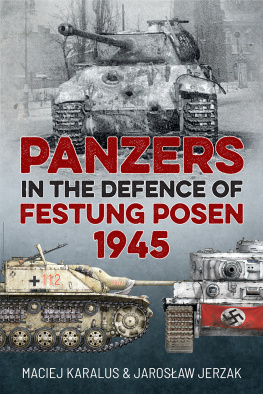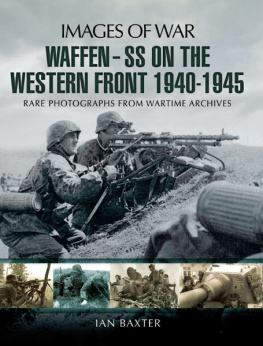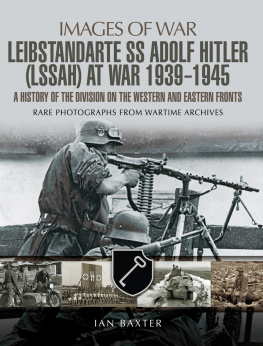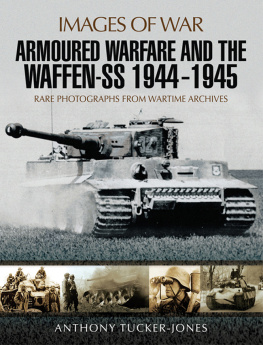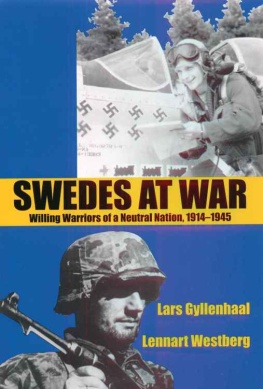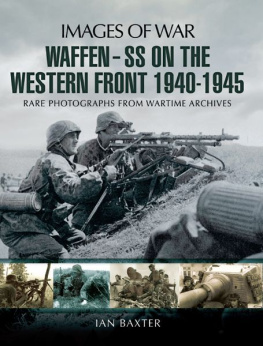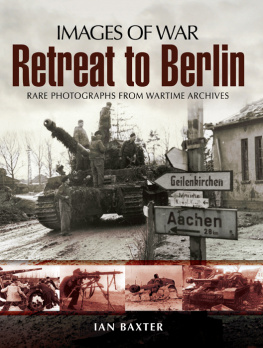
Voices of the Waffen SS The Assault generation
Gerry Villani 2018
History is always written by the victor, and the histories of the losing parties belong to the shrinking circle of those who were there...
SS-Standartenfhrer Jochen Peiper 1. SS-Panzer-Division Leibstandarte Adolf Hitler
Contents
Foreword
I am absolutely honored to introduce you to Gerry Villani and his latest work of art. Gerrys focus has always been on telling the stories that no one else will tell, giving a voice to those that no one has listened to, and doing it in a way that others have not. With his last book Soldiers of Germania, the European Volunteers of the Waffen SS , he gave us insight into the experiences of men from all across Europe who volunteered to serve as foreign SS soldiers. The story he brought to us is one that many do not know. It is commonly implied that the German Army, and German soldiers, were all of undiluted German heritage, when in fact men from over 30 countries served in the SS. Gerry has granted us access to the lives and perspectives which are unique and widely unknown to the world.
The route that many stories throughout history take is a path that from far away looks smooth and truly has been worn into a comfortable retelling of events. Once again Gerry stepped off the beaten path and into the weeds. He has compiled through personal research the up close and personal stories that many are too afraid to tell or be associated with. We find him in the trenches with the soldiers. We find him sitting in the shadows of conflict. He diligently transcribed the stories of these veterans, stories which have long gone untold - buried in the depths of memory, or whispered through the din of battle, nearly lost in the fog of war. I picture him, but a silhouette, following closely behind these soldiers as they say goodbye to their families and march towards their destiny. What Gerry has done for history is invaluable and what he has done for these men is unparalleled. But a glaring question still remains...why? Why would someone go through the troubles of searching the world for the tales of a few men whose lives have been eagerly forgotten by the people they once fought to protect? What makes a man voluntarily suffer the loss of sleep, time with loved ones, and his peace of mind - only to spend months chasing ghosts?
For Gerry the fascination with mankind's penchant for conflict started at a young age. Whenever he visited his grandparents, he was regaled with stories of the war. First-hand accounts of battle and the impact that war had on the world enchanted Gerry. Peering through the eyes of his grandparents, he learned that the actions of individual men created and shaped the world we live in today. Seeing that the individual - when helped by fate, luck, and chance - could affect not only his surroundings, but the globe, would start Gerry down a path in life from which he would never divert. With his latest book Germanias Assault Generation , we will be brought back into a world at war, where men of many nations believed in a united Europe, and joined the Waffen SS with enthusiasm in hopes of accomplishing that goal they believed in. We read the stories of Legionnaires, people of so-called Germanic descent, who originated from occupied territories. With an insight into the motivations and internal conflicts that these volunteering soldiers went through, how their cultural backgrounds affected their positions in the military, and the way they viewed conflict and battle, this book is another unique take on the soldiers who fought in World War Two. I know that you will enjoy this book as much as I did, and it is my absolute privilege to present to you "Voices of the Waffen SS The Assault generation".
Jennifer Georg, Ohio, August 2017
A Word from the Author
When the final battle was fought and the dead are gathered on the battlefields, a lonely soldier was found on the side of a hill. This soldier took up position behind a tree, with on the ground right next to him, several clips of ammunition for his rifle as a silent witness to his decision: to hold his position or to die. He died. The soldier lost his life on the side of the hill as a bullet had penetrated his head right under his steel helmet. When silence had taken over again on the hill and on the battlefield, the soldier was still sitting there in position with his rifle at the readyready to fire. He was still waiting patiently for the enemy to arrive, an enemy hed ultimately never see. A lonely soldier was sitting on the side of the hill whose courage became him fatal. A soldier like any other soldier in the world. Most people like to call them SS monsters, although SS Mann would be more appropriate for Waffen SS soldiers. To call them all SS monsters is just an ignorant way to look at the history of the Waffen SS. Lots of Waffen SS soldiers only heard after the war that they were called fanatics, but that word was unknown to them during the war. Instead they were good soldiers, hard soldiers, and hard-fighting soldiers. The will of fighting was necessary to the last. Every man was willing to sacrifice himself, but whether this was fanatic or not Ill leave that up to you. Some people may call it that way but it still remains a strange word. It was certainly not a word that was used by the Waffen SS soldiers. They called it the love for the fatherland and for their people! These men were called the assault generation of Germania, or greater Germany, and they had largely been born in the years during and after World War I. Coming from every nation of Europe, they had risen up against communism and banded together under one flag for a common cause. They joined the German Army in World War II, a volunteer army that was better known as the Waffen SS. And it was in the Waffen SS, the elite fighting force of Germany, where the first modern European army was born. A new society of front fighters emerged from many different European nations; it was a society that had been forged in the sacrifice, sweat, and blood on the battlefield. Maybe their heritage and culture was different, but their uniforms and motto were one and the same: Meine Ehre Heit Treue! SS soldiers were held to higher standards than regular Wehrmacht soldiers in the German Army, and the SS was subjected to the strictest discipline. For example, sentences handed down by SS courts were more severe than sentences passed by other courts for the same offense. A separate wing on the east side of the bunker (camp prison) at Dachau was reserved for SS soldiers who had committed a criminal act. This section has been torn down and can no longer be seen at the Dachau Memorial Site. When Dachau was liberated on April 29, 1945, there were still 128 SS men incarcerated in the Dachau bunker. They were released and given the job of guarding the prisoners until the American liberators arrived. Most of the regular guards at Dachau had fled the night before the camp was liberated. In 1943, a Waffen SS officer named Dr. Georg Konrad Morgen, who was also an attorney, was authorized by Himmler to conduct investigations into corruption and brutality in the concentration camps. Around 800 investigations of the SS were conducted, which resulted in around 200 indictments. At the Nuremberg International Military Tribunal, SS Lt. General Ernst Kaltenbrunner testified that there were 13 Stammlager (main concentration camps) in the Nazi camp system. One of these camps was Matzgau, located near Danzig; it was a camp where SS guards were imprisoned for offenses such as physical mistreatment of concentration camp prisoners, embezzlement, or theft. Yet tour guides at Dachau routinely tell visitors that the guards could do anything they wanted to with regard to abusing or killing the prisoners.
Next page


